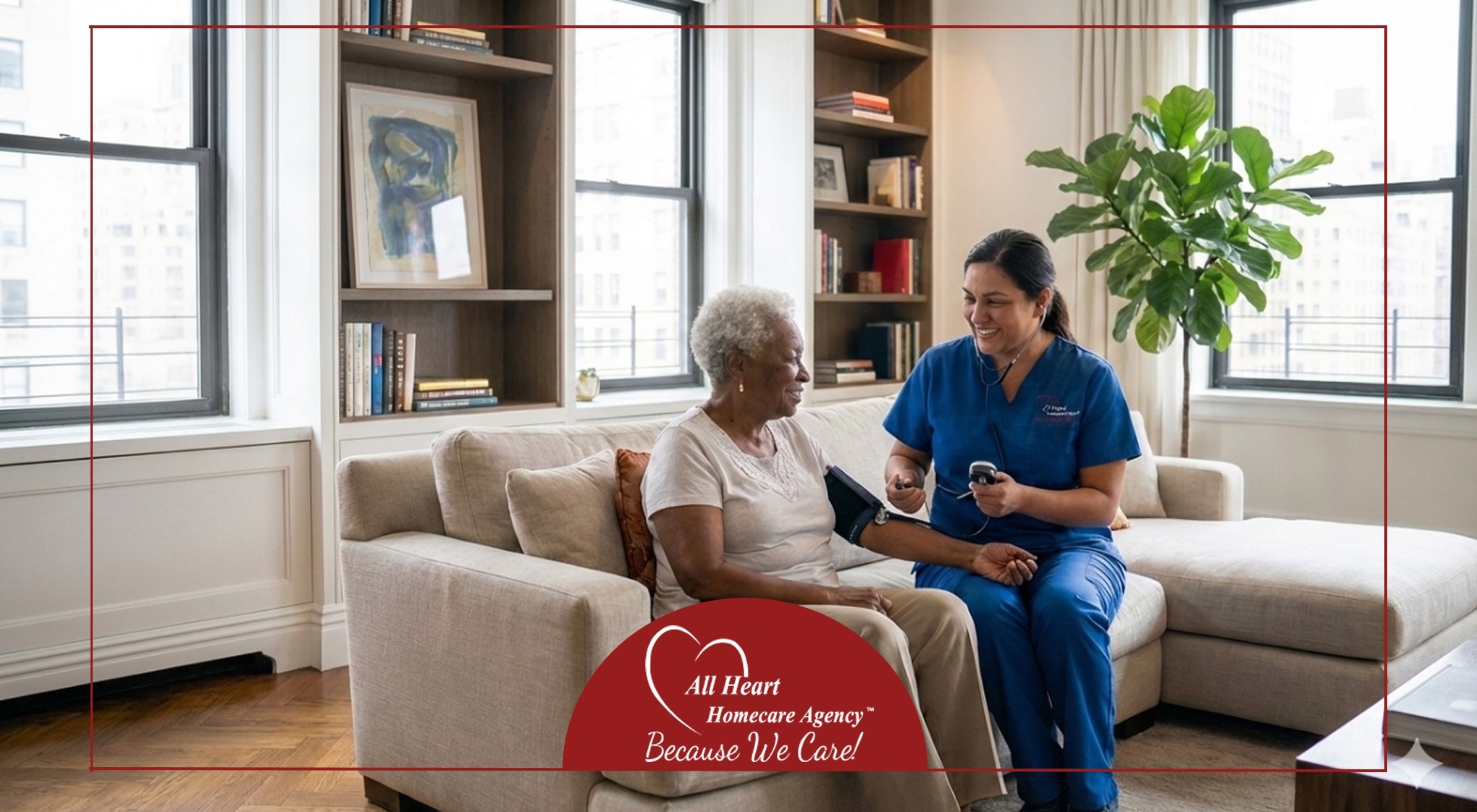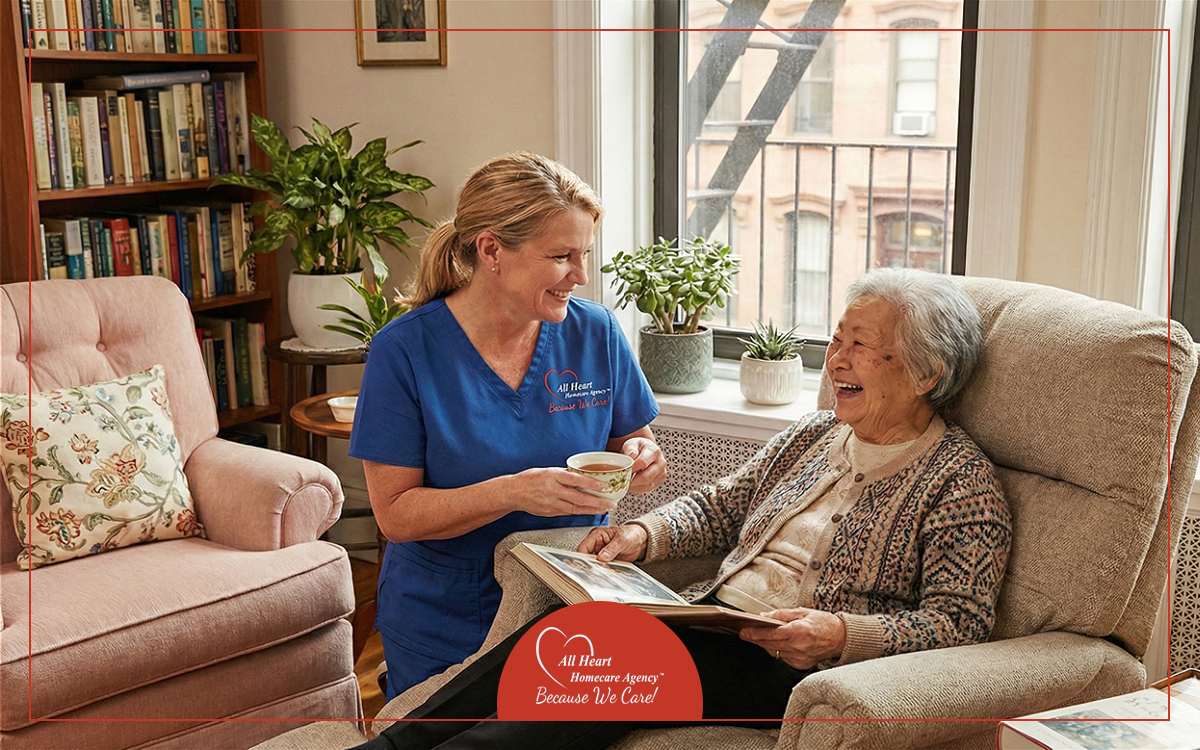The shorter days arrive quietly at first. Your elderly mother mentions feeling more tired than usual. Your father, who once looked forward to his morning walks, now prefers staying indoors. As autumn transforms into winter, many families notice their senior loved ones becoming quieter, more withdrawn, and less interested in activities they once enjoyed.
You’re not imagining these changes, and your loved one isn’t simply “getting older.” According to the National Institute of Mental Health, up to 6% of seniors experience seasonal depression, with symptoms often intensifying during fall and winter months when daylight becomes scarce and temperatures drop.
Caring for a senior with seasonal depression can feel overwhelming, especially when you’re already managing other health conditions like Alzheimer’s, dementia, or traumatic brain injury. The good news is that with the right strategies and community support, families can help their loved ones maintain emotional well-being throughout the darker months.
This guide offers practical and compassionate strategies for recognizing seasonal depression in seniors and implementing effective fall and winter wellness approaches that respect their dignity and comfort. Every senior deserves to feel supported and valued, regardless of the season.
Understanding Seasonal Depression in Seniors
Seasonal Affective Disorder (SAD) affects older adults differently than younger populations. While younger people might experience seasonal mood changes as temporary dips in energy, seniors face unique challenges that can make seasonal depression more severe and longer-lasting.
The aging brain responds differently to reduced sunlight exposure. As we age, our circadian rhythms—the internal clock that regulates sleep and mood—become more sensitive to light changes. When daylight hours decrease dramatically during fall and winter, seniors often experience disrupted sleep patterns, which directly impacts mood regulation and cognitive function.
Several risk factors make seniors particularly vulnerable to seasonal depression:
- Social isolation becomes more pronounced during colder months when transportation is difficult
- Chronic health conditions like arthritis worsen in cold weather, limiting mobility and independence
- Medication side effects can interact with seasonal changes, affecting mood and energy levels
- Limited mobility prevents seniors from accessing natural light and outdoor activities
For seniors managing dementia, Alzheimer’s, or TBI, seasonal depression creates additional complications. These conditions already affect mood regulation and cognitive function. When combined with seasonal changes, families may notice increased confusion, agitation, or memory difficulties that extend beyond their loved one’s baseline symptoms.
Recognizing the Warning Signs
Early recognition of seasonal depression in seniors requires careful observation of behavioral and mood changes. Unlike clinical depression, seasonal depression follows predictable patterns tied to changing seasons and daylight hours.
Key warning signs to monitor:
- Sleep pattern changes: Sleeping significantly more or less than usual, difficulty staying asleep, or changes in sleep timing
- Loss of interest: Abandoning previously enjoyed activities, hobbies, or social connections
- Appetite fluctuations: Eating significantly more or less, craving carbohydrates, or losing interest in favorite foods
- Social withdrawal: Avoiding family gatherings, declining phone calls, or expressing reluctance to leave the house
- Increased confusion: For those with cognitive conditions, seasonal depression may worsen existing memory or thinking difficulties
It’s important to differentiate between normal seasonal adjustment and concerning symptoms requiring intervention. Everyone feels somewhat different during shorter, colder days. However, when these changes persist for more than two weeks, significantly impact daily functioning, or cause distress for your loved one, it’s time to take action.
| Normal Seasonal Adjustment | Seasonal Depression Concerns |
| Slight preference for staying indoors | Complete avoidance of outdoor activities |
| Occasional low-energy days | Persistent fatigue lasting weeks |
| Mild changes in sleep patterns | Dramatic sleep disruptions or excessive sleeping |
| Reduced social activity | Complete social withdrawal and isolation |
| Seasonal food preferences | Significant appetite loss or overeating |

Creating Light and Warmth in Their World
Light therapy represents one of the most effective interventions for seasonal depression in seniors. The goal is to increase exposure to bright light that mimics natural sunlight, helping regulate circadian rhythms and improve mood naturally.
Simple environmental modifications make a significant difference:
- Maximize natural light: Position your loved one’s favorite chair near the largest window in their living space
- Upgrade lighting: Replace dim bulbs with bright LED lights (at least 10,000 lux) in areas where they spend the most time
- Maintain open curtains: Keep window coverings open throughout daylight hours, even on cloudy days
- Create bright gathering spaces: Ensure dining areas and social spaces have abundant lighting for meals and activities
Light therapy boxes designed specifically for seniors offer structured light exposure. These devices provide controlled, safe, bright light therapy when natural sunlight is insufficient. For seniors with limited mobility or memory issues, consider timer-controlled light boxes that automatically provide morning light exposure without requiring them to remember daily use.
Safety considerations for light therapy:
- Consult healthcare providers before starting light therapy, especially for seniors taking medications that increase light sensitivity
- Position light boxes at eye level, approximately 16-24 inches away
- Use light therapy for 20-30 minutes each morning, preferably within the first hour of waking
- Monitor for eye strain, headaches, or increased agitation, which may indicate the need for adjustment
For seniors managing cognitive conditions, consistent light exposure routines become even more important. Consider enlisting family members or caregivers to ensure daily light therapy happens at the same time each day, creating structure and predictability.
Building Social Connection During Isolation-Prone Months
Social interaction serves as a powerful antidote to seasonal depression. When cold weather and shorter days naturally encourage isolation, intentional efforts to maintain connections become essential for senior mental health.
Practical strategies for maintaining social connections:
- Establish regular communication schedules: Weekly phone calls, video chats, or in-person visits provide anticipated social contact
- Explore senior community programs: Many community centers, libraries, and faith-based organizations offer winter programming specifically designed for older adults
- Leverage technology: Tablets and smartphones can connect seniors with family members, virtual church services, or online senior social groups
- Create structured social activities: Weekly card games, book clubs, or craft sessions provide regular opportunities for interaction
For families serving Russian, Hispanic, and American communities, cultural considerations enhance social connection effectiveness. Seek out cultural community centers, language-specific support groups, or traditional celebration opportunities that honor your loved one’s heritage and provide familiar social contexts.
| Social Connection Strategy | Implementation Tips | Benefits |
| Regular family calls | Schedule same day/time weekly | Provides predictability and anticipation |
| Community senior programs | Research local offerings, transportation needs | Offers peer interaction and structured activities |
| Virtual religious services | Set up technology, practice together | Maintains spiritual connection and community |
| Cultural community events | Connect with cultural centers, volunteer help | Honors heritage while combating isolation |
Remember that seniors with dementia or TBI may require modified social approaches. Focus on familiar faces, shorter interaction periods, and activities that don’t overwhelm cognitive capabilities while still providing meaningful connections.

Professional Support and When to Seek Help
Understanding when seasonal depression requires professional intervention protects your loved one’s safety and well-being. While many seasonal depression symptoms can be managed through environmental changes and increased social support, certain warning signs indicate the need for immediate professional assistance.
Clear indicators requiring professional intervention:
- Persistent symptoms lasting more than two weeks without improvement despite environmental modifications
- Expressions of hopelessness or statements about life not being worth living
- Significant changes in daily functioning, such as inability to manage personal hygiene, medication compliance, or basic self-care
- Increased confusion or cognitive decline beyond baseline levels for those with existing cognitive conditions
- Physical symptoms like dramatic weight loss, dehydration, or medication non-compliance
Several types of professional support can address seasonal depression in seniors effectively. Geriatric psychiatrists specialize in mental health conditions affecting older adults and understand how seasonal depression interacts with age-related health changes. Licensed social workers can provide counseling while connecting families with community resources and support services.
Home care specialists trained in mental health offer unique advantages for seniors who have difficulty traveling to appointments. These professionals can assess your loved one’s home environment, provide in-home counseling, and work with families to implement daily wellness strategies.
When communicating with healthcare providers about seasonal depression:
- Document specific behavioral changes with dates and examples
- Prepare a list of current medications, as some can worsen seasonal depression symptoms
- Bring a comprehensive health history, especially noting previous episodes of depression or seasonal mood changes
- Include family members or caregivers who spend significant time with your loved one to provide additional observations
Most insurance plans provide coverage for mental health services. For families facing financial constraints, many community organizations offer sliding-scale counseling services, and some home care agencies provide mental health support as part of comprehensive senior care packages.
Your Commitment to Their Comfort
Preventing seasonal depression in seniors requires consistent, loving attention, but the difference it makes in quality of life is immeasurable. The strategies we’ve explored—environmental modifications, social connection, proper nutrition, gentle activity, and professional support when needed—work together to create a comprehensive approach to seasonal wellness.
Trust your instincts as a caregiver. You know your loved one better than anyone, and subtle changes you notice often signal the need for intervention before symptoms become severe. Equally important is seeking support for yourself. Caregiving during the challenging winter months requires emotional and practical resources that no one should manage alone.
Your next steps toward seasonal wellness:
- Create a personalized seasonal wellness plan incorporating light therapy, social activities, and environmental modifications
- Connect with local senior services, cultural community centers, and mental health resources in your area
- Build a support network, including family members, friends, and professional caregivers who understand your loved one’s needs
- Download tracking tools to monitor mood changes, sleep patterns, and behavioral shifts throughout the fall and winter months
At All Heart Homecare, we understand the challenges and triumphs of caring for elderly loved ones through every season. Our team of compassionate caregivers has supported over 6,000 clients and their families, maintaining a 95% client satisfaction rate by providing the specialized care seniors need to thrive year-round. Together, we can ensure your loved one experiences comfort, dignity, and emotional well-being regardless of what the weather brings.











